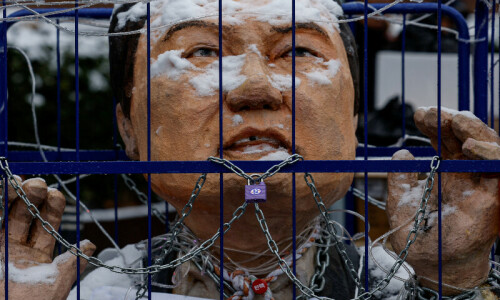
• Only one suspect is in custody
• No clue to husband, children of female suicide bomber
KARACHI: Even after passing of a year to the suicide bombing on the premises of the University of Karachi in which three Chinese teachers were killed, police and other allied agencies have failed to trace and arrest the masterminds of the attack, including the husband of suicide bomber Shari Baloch, it emerged on Tuesday.
On April 26, 2022 four people, including three Chinese nationals, were killed and as many wounded when the female suicide bomber blew herself up at the entrance of the Confucius Institute, located on the premises of the Karachi University, targeting a van carrying Chinese teachers. The outlawed Balochistan Liberation Army claimed responsibility for the attack.
To date, law enforcement agencies are groping in the dark to find out the whereabouts of Dr Haibatan, the spouse of Shari Baloch, who, along with his two children, went into hiding before his wife carried out the suicide bombing.
The case is pending trial before an antiterrorism court as only one suspect, said to be a facilitator, is in custody and remaining suspects — Haibatan Baloch, BLA commanders Bashir Zeb, Rehman Gul, Khalil Waja, spokesman Mir Safeer — have been declared proclaimed offenders.
According to the charge sheet filed by the police in the ATC, Dad Bux was arrested on July 4, 2022 near Machli Chowk on Hawkesbay Road. He allegedly conducted reconnaissance and provide information to other suspects.
Following the attack, the Confucius Institute was closed for some time but later on, it resumed its academic activities.
A KU official, who wished not to be named, said that it was decided by Pakistani and Chinese authorities that the Chinese would not physically teach at the institute till a satisfactory security situation. Therefore, now Pakistani students who had studied in China were teaching at the KU while Chinese academics gave lectures online from China.
Fallout of the attack
The suicide attack carried out by a woman highlighted a shift in Baloch militancy and that resulted in a crackdown on not only on separatist elements, but also on students and enhanced security for Chinese working in Pakistan.
Security analysts said that the KU blast targeting Chinese academics produced two outcomes. First a crackdown is launched on separatist elements and radicals, mostly students, not only in Karachi and Balochistan, but also in other parts of the country, particularly in academic institutes of Punjab and Islamabad.
Mohammad Amir Rana, director of Pak Institute of Peace Studies (PIPS), told Dawn that the scale of Baloch militancy was limited, but its intensity had been increased.
Besides, he added that perception was gaining strength that radicalism, particularly among educated Baloch youth belonging to the Baloch Students Organisation (BSO), was also increasing. The use of a female suicide bomber, who was an educated woman, indicated this situation.
Mr Rana said that mainstream parties and Baloch tribal chieftains might be against suicide bombing, but militant groups had adopted it as their strategy.
Citing data maintained by the PIPS, Mr Rana said that after the KU blast, a significant crackdown was launched on Baloch and Sindhi separatist elements and scores of them were detained. The Baloch students were also detained from the Punjab University and the Quaid-i-Azam University.
The second trend which has been noticed after the KU suicide bombing is related to provision of enhanced security to Chinese working on CPEC and non-CPEC related projects.
Talking to Dawn, South-SSP Syed Asad Raza said that the security for Chinese, who mostly lived or have offices in South district, had remained a concern for law enforcers.
He revealed that there were over 120 locations in South district where some hundred Chinese associated with CPEC and non-CPEC were living or working in offices. “Providing security to these Chinese is a serious concern for law enforcers amid growing threats,” he observed.
Published in Dawn, April 26th, 2023














































Dear visitor, the comments section is undergoing an overhaul and will return soon.